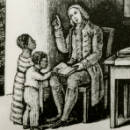 |
Anthony Benezet  
Anthony Benezet (1713-1784) was a native of France who became a Quaker at age
fourteen. In 1731 he came to Philadelphia and in 1736 married Joyce Marriott. He was
a teacher for most of his life and was active in promoting an end to slavery and the
slave trade. He wrote and distributed many papers and tracts dealing with slavery,
American Indians and education. |
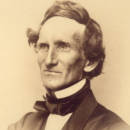 |
Elihu Burritt  
Elihu Burritt (1810-1879) was born in New Britain, Connecticut. Known as the "Learned
Blacksmith" because he was primarily self-taught, Burritt was a social reformer,
abolitionist, pacifist, linguist, and internationalist. Although a staunch
abolitionist and a believer in complete equality among the races, he opposed the
American Civil War on absolute pacifist principles. Burritt proposed a system of
"compensated emancipation" to pay Southern slave owners to free their slaves.
|
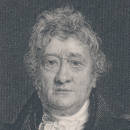 |
Thomas Clarkson  
Thomas Clarkson (1760-1846)was born in England. He first became interested in
abolitionism in 1785, an Anglican minority in the overwhelmingly Quaker anti-slavery
movement. Clarkson devoted the rest of his life to ending slavery in the United
Kingdom, and when that was accomplished with the Slavery Abolition Act of 1833, he
continued to work towards emancipation in America. |
TOP |
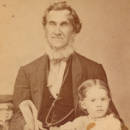 |
Joseph A. Dugdale  
Joseph Dugdale (1810-1896) was a Quaker minister, farmer, and reformer, born in
Bristol, Pennsylvania in 1810. He lived in Ohio, where he was part of the
progressive group at Green Plain that split from Indiana Yearly Meeting;
Pennsylvania, where he helped organize Pennsylvania Yearly Meeting of Progressive
Friends (also known Longwood Yearly Meeting); and Iowa, where he died in 1896.
|
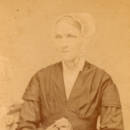 |
Ruth Dugdale  
Ruth Dugdale (1801-1896) rivaled her husband, Joseph, in her zeal for reform causes.
She was a respected Quaker minister, and participated actively in anti-slavery,
temperance, women's rights, and other movements in Ohio, Pennsylvania, and Iowa. She
survived her husband and died in 1896. |
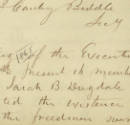
|
Sarah B. Dugdale 
Sarah B. Dugdale (1787-1880) was the mother of Joseph A. Dugdale and the progenitor
of his liberal ideals. She was involved in the American Anti-Slavery Society nearly
from its founding, continued to participate in Progressive Friends societies and
other reform movements until her death in 1880. |
TOP |
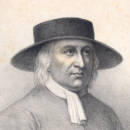 |
George Fox  
George Fox (1624-1691) was the founder of the Religious Society of Friends. He was an
English Dissenter who believed that spiritual truth resided in every person, and
that following one's own "inner light" was paramount; he denounced ritualized
worship, standardized doctrine, and clerical authority. Fox preached testimonies of
peace, equality, integrity, and simplicity. In 1657, his cautionary letter "To
Friends Beyond Sea, that Have Blacks and Indian Slaves" expounded on the testimony
of equality of men in the eyes of God. |
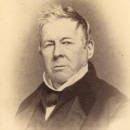 |
Thomas Garrett   
Thomas Garrett (1789-1871) was a Quaker and a known conductor of the Underground
Railroad. In 1848 he and fellow Quaker John Hunn were brought to trial by two
slave-owners on charges of harboring and aiding fugitive slaves. The defendants were
found guilty by the U.S. Circuit Court in Delaware, presided over by Chief Justice
Roger B. Taney, who ten years later would deliver the landmark 'Dred Scott
Decision.' Harriet Beecher Stowe cites Garrett's 1848 trial as inspiration for some
scenes in her influential anti-slavery novel 'Uncle Tom's Cabin.' |
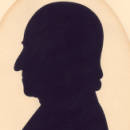 |
Elias Hicks  
Elias Hicks (1748-1830) was an eminent Quaker minister from Jericho, Long Island,
N.Y. He was a farmer, partner in a tannery, and had a knowledge of surveying. In
1771, he married Jemima Seaman, daughter of Jonathan and Elizabeth (Willis) Seaman.
Beginning in 1776, Hicks served on a committee that visited friends' homes and urged
members of Westbury Monthly Meeting to manumit any slaves they owned. He was
recognized as a minister in 1779 and during the next fifty years, made sixty-three
visits as a traveling Friend to meetings in the United States. In the 1820s, a
religious controversy within the Society of Friends which focused on Hicks' ministry
led to the so-called Hicksite-Orthodox Separation of 1827-1828. |
TOP |
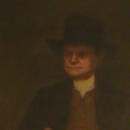
|
Isaac T. Hopper   
Isaac T. Hopper (1771-1852) was a Quaker reformer and abolitionist. Born in 1771,
Hopper became a staunch Hicksite. He was active in prison reform and abolition, and
was the editor of the National Anti-slavery Standard. Hopper was disowned by New
York Yearly Meeting of Friends in 1842 because of an article which appeared in his
publication. |
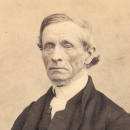
|
Samuel M. Janney  
Samuel M. Janney (1801-1880) was a Virginia Quaker minister, author, educator, and
reformer. In 1839 he opened a boarding school for girls in Loudoun County. He
traveled widely in the ministry, meeting with other denominations as well as being
immersed in the contemporary issues facing the Society of Friends. Among his
activities were establishing schools for African Americans and women, creating
public schools in Virginia, and working for the abolition of slavery. In 1869 he was
appointed Superintendent of Indian Affairs in Nebraska. A detailed
inventory of the Samuel M. Janney papers held by the Friends Historical
Library is available online. |
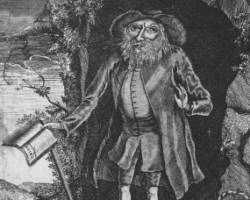 |
Benjamin Lay  

Benjamin Lay (1677-1757) was born in England and lived in Barbados for 10 years
before settling near Philadelphia. He considered himself a Quaker all his life,
although he was denounced by many in the Society for his extreme beliefs and
eccentric behavior. Lay was a strict vegetarian, wore a very prominent beard, and
vehemently denounced the use of any products made with a trace of slave labor.
"All Slave-Keepers..." was, in 1737, one of the first antislavery books
printed in America.
|
TOP |
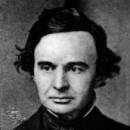 |
J. Miller McKim  
James Miller McKim (1810-1874) also spelled M'Kim, was born in Pennsylvania in 1810.
He was a Presbyterian minister, an abolitionist, and a known conductor of the
Underground Railroad. He was present at the Anti-Slavery Society's headquarters in
Philadelphia when they received a package containing Henry "Box" Brown, a slave from
Richmond who literally mailed himself to freedom. |
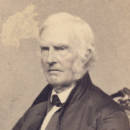 |
James Mott  
James Mott (1788-1869) was a prominent Philadelphia Quaker minister and a leader in
reform movements, especially antislavery, education, peace, and women's rights. He
was born in 1788 in Long Island. In 1811, he married Lucretia Coffin and they
settled in Philadelphia. Both Motts were active Hicksite Quakers, and James Mott was
a founder of the American Slavery Society in 1833. In 1840, the couple went to
England to attend the first World's Antislavery Convention and Lucretia met
Elizabeth Cady Stanton. They decided to organize a women's rights convention, which
was held in Seneca Falls, N. Y. in 1848. James was elected to chair the convention.
The Motts were active in the founding of Swarthmore College, a coeducational
institution incorporated in 1864, and supported the founding of the nation's first
medical school for women, Woman's Medical College of Pennsylvania. James Mott died
in 1869. |
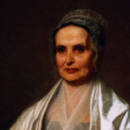 |
Lucretia Mott  
Lucretia Coffin Mott (1793-1880)was a prominent Philadelphia Quaker minister and a
leader in reform movements, especially antislavery, education, peace, and women's
rights. She was born in 1793 in Nantucket, Massachusetts, and after marrying James
Mott in 1811, settled in Philadelphia. The Motts were active Hicksite Quakers, and
Lucretia served as clerk of Philadelphia Yearly Meeting and traveled in the
ministry. Lucretia was a founder of the Philadelphia Female Antislavery Society. In
1840, she and James went to England to attend the first World's Antislavery
Convention and Lucretia met Elizabeth Cady Stanton. In 1848, she and Stanton
announced a conference on women's rights to be held at Seneca Falls, N.Y., generally
considered to be the first women's rights convention in America. She and her husband
were active in the founding of Swarthmore College and supported the founding of the
nation's first medical school for women, Woman's Medical College of Pennsylvania,
and the School of Design for Women, now Moore College of Art. Lucretia Mott died in
Philadelphia in 1880. |
TOP |
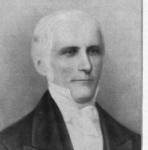 |
Daniel Neall, Sr.   
Daniel Neall (1784-1846) was a Philadelphia Quaker, a dentist, and an abolitionist.
He was presiding over the Pennsylvania Hall Association at the time the Hall was
destroyed by a mob in 1838— an event which was also witnessed, in horror, by
his 20-year-old son. Several years later, while travelling in Delaware with his
wife, Sarah Mifflin, and her cousin Lucretia Mott, Neall was seized by an angry mob
of slave-holders. Having heard that Mott and her companions were abolitionists, they
decided to tar-and-feather Daniel Neall. After they released him, Neall reputedly
forgave the mob and invited any of them to call upon him for hospitality if they
ever visited Philadelphia. When Daniel Neall died in 1846, he was eulogized by his
friend, the great American poet John G. Whittier. |
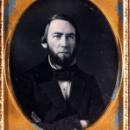 |
Daniel Neall, Jr.   
Daniel Neall Jr. (1817-1894) was to Daniel and Sarah M. Neall, the younger Daniel
Neall was a dentist, abolitionist, and ardent Quaker, as his father had been. In
1838, he watched his father struggle vainly for the anti-slavery cause against the
crowd that destroyed Pennsylvania Hall. Daniel Neall junior survived his father to
see the end of slavery in America, and in 1883, as secretary of the American
Anti-slavery Society, he helped organize the conference that celebrated the
society's 50th anniversary. |
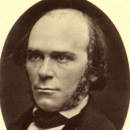 |
Theodore Parker  
Theodore Parker (1810-1860) was a Unitarian minister involved in many reform
movements, but most active in anti-slavery. Many of his views were congruent with
those of the Progressive Friends, with whom he was involved in the years leading to
his death. |
TOP |
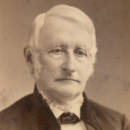 |
Dillwyn Parrish  
Dillwyn Parrish (1809-1886) graduated from the College of Pharmacy in Philadelphia
and operated a pharmacy with his brother Edward. The Parrishes were a prominent
Quaker family in the Philadelphia area, noted for their philanthropy. An active
member of Philadelphia Monthly Meeting, he served as Overseer, Clerk, and Elder. He
was also a member of the Pennsylvania Society for Promoting the Abolition of Slavery
and Improving the Condition of the African Race from 1832-1886, serving as its
President in 1851. |
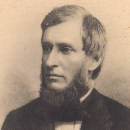 |
Edward Parrish  
Edward Parrish (1822-1872) shared a pharmacy with his brother, Dillwyn. In addition
to the pharmacy Edward also taught at the Philadelphia College of Pharmacy. He was
active in New York, Philadelphia, and Baltimore Yearly Meetings (Hicksite), and was
a primary fundraiser for Swarthmore College, a Quaker educational institution
incorporated in 1864. Edward Parrish was the first president of the college,
although he resigned in 1871 due to conflicts with the Board of Managers. In 1872 he
was appointed to a Commission to negotiate a treaty with the Kiowa and Comanche
tribes, and he died of malaria on this mission to Indian Territory in the same
year. |
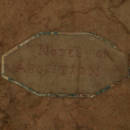 |
John Parrish (1729-1807)  
John Parrish (1729-1807) is best known for his anti-slavery book 'Remarks on the
Slavery of the Black People.' Published in 1806, the book advocated the total
abolition of slavery, as opposed to the abolition of just the slave trade. John
Parrish died the following year. Edward and Dillwyn Parrish were sons of Susanna Cox
and Joseph Parrish, whose father, Isaac, was John Parrish's brother. |
TOP |
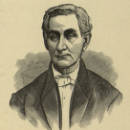 |
Elijah Pennypacker  
Elijah F. Pennypacker (1804-1888) a convinced Quaker, was originally of Mennonite
descent. He was a politician and activist who labored tirelessly in the
anti-masonic, temperance, and anti-slavery movements. Pennypacker's home in Chester
County, Pa., was a vital station on the underground railroad. He was a member of
Radnor Monthly Meeting and a minister until his death in 1888. |
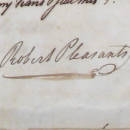 |
Robert Pleasants  
Robert Pleasants (1723-1801) was a Quaker plantation-owner who, inspired by Anthony
Benezet, went from slaveholder to abolitionist in a few short years. After deciding
to free his slaves in 1782, Pleasants founded the first school for free blacks in
Virginia and helped organize the Virginia Abolition Society. |
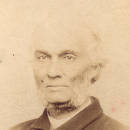 |
Robert Purvis 
Robert Purvis (1810-1898) was an African-American abolitionist, born to a free woman
of color and a wealthy white Englishman. Purvis spent the majority of his life in
Philadelphia, where he used his wealth and education to forward the cause of
African-Americans. He attended the Anti-Slavery Convention of 1833 and was one of
the founders of the American Anti-Slavery Society, and he also worked on the
Underground Railroad. Purvis died in 1898. |
TOP |
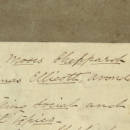 |
Moses Sheppard  
Moses Sheppard (1775-1857) was a Quaker humanitarian and businessman of Baltimore,
Maryland. Born in 1775, he never married, and devoted most of his life to a number
of social reforms. As a member of Baltimore Monthly Meeting, he was active in a
number of committees, including that of Indian Affairs of Baltimore Yearly Meeting.
Sheppard was deeply concerned with the issues of American and Caribbean slavery, and
for many years was principally involved in the Maryland Colonization Society—although
his involvement later waned as he became disillusioned with developments in the
Anti-Slavery movement, particularly what he perceived as extremism in the North.
Sheppard was also committed to improving the conditions of mental health care
facilities, and upon his death in 1857 devoted his bequest to founding the Sheppard
Asylum. It is still in existence today as the Sheppard Pratt Health System. |
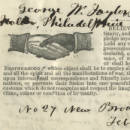 |
George Washington Taylor  
George Washington Taylor (1803-1891) was a pupil of the Quaker educator Enoch Lewis.
Taylor was a convinced Friend who devoted his life to social reform, especially
anti-slavery, temperance, and the peace movement. He ran a free labor goods store in
Philadelphia from 1847-1867; was an agent of the Friends Bible Association; and as a
publisher produced the periodicals "The Non-Slaveholder" and the peace-oriented "The
Citizen of the World." |
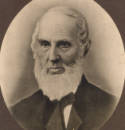 |
John G. Whittier   
John Greenleaf Whittier (1807-1892) was a Massachusetts Quaker, an abolitionist, and
one of the most well-known poets of the 19th century. He was a founding member of
the American Anti-Slavery Society in 1833; the same year he published "Justice and
Expediency," a radical pamphlet which called for the immediate abolition of slavery.
Many of his poems dealt with themes related to slavery and abolitionism, but today
his most well-known work is "Snow-Bound," a long narrative poem about fixing
memories of the idyllic past. |
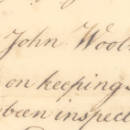 |
John Woolman  
John Woolman (1720-1772) was born to Quaker parents in New Jersey and spent his life
travelling and preaching against slavery and war. In 1754 he wrote "Some
Considerations on the Keeping of Negroes," an anti-slavery tract which was published
by Philadelphia Yearly Meeting and distributed to every yearly meeting in America.
Woolman kept a journal for over a decade, published in 1774, soon after his death.
Woolman's journal is still considered an important document in the fields of
religion, history, and literature. |
TOP |




























